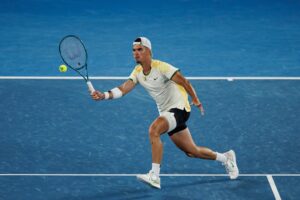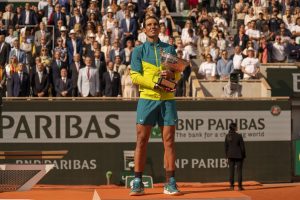Jelena Ostapenko shocked the tennis world three years ago by winning the title at Roland Garros as an unseeded 20-year-old. Ranked 47th in the world at the time, the Latvian came from a set and a break down to defeat heavy favourite Simona Halep to win her first Grand Slam. It was, astonishingly enough, also her first tour-level title. But, with the exception of that run to the title in 2017, Ostapenko had failed to win a match in the main draw in Paris.
Until this year that is. The former champion is now into the third round, having knocked out Madison Brengle and the second seed Karolina Pliskova, losing only a handful of games in the process. With Ostapenko looking in excellent form and her all-or-nothing record in Paris, it is perhaps unsurprising that the Latvian is again being tipped for the title in some corners. But does the 23-year-old have what it takes to go all the way at Roland Garros again?
Jelena Ostapenko in the past three years
After lifting the trophy in 2017, Ostapenko backed up her efforts in Paris with a run to the Wimbledon quarterfinals, which suggested quite forcefully that she would not be a one-Slam wonder. Indeed, Ostapenko put together a strong run of form in the year following her triumph at Roland Garros, with the highlights including a second career title at the Korean Open that September and a run to the final at the Miami Open in early 2018.
When title defence on the clay courts at Roland Garros the following year ended swiftly, Ostapenko spoke openly about her efforts to forget her first-round exit in Paris. And those efforts appeared to be successful for Ostapenko, who performed well on the grass for the second year in a row. In fact, she went one better at Wimbledon, reaching the semifinals at a Grand Slam for the second time, though she was beaten comfortably enough there by Angelique Kerber.
Nonetheless, the future certainly looked bright for the Latvian. But fast forward to the end of 2019 and Ostapenko had made no notable runs since, with the possible exception of a third-round showing at the US Open. That said, she had been enjoying success in doubles, making the final at Wimbledon in the mixed doubles playing with Robert Lindstedt, as well as reaching the final at the China Open in Beijing alongside Dayana Yastremska.
Perhaps recognising the need for change, Ostapenko hired Marion Bartoli towards the end of the year and began to regain her form, making successive finals in Linz and Luxembourg. She lost in the former to the young gun Coco Gauff, but defeated defending champion Julia Goerges in the latter to win her first title in two years.
Tragically, at the start of 2020 Ostapenko announced the death of her father and subsequently withdrew from the Auckland Open, which would have been her first tournament of the year. She then lost in the second round at Melbourne Park to sixth seed Belinda Bencic, having been handed a difficult draw. But in February, just before the season was suspended due to the coronavirus pandemic, Ostapenko beat newly crowned Australian Open champion Sofia Kenin in Fed Cup action.
Her French Open so far
Ostapenko has dropped just nine games en route to the third round, where she will face the Spaniard Paula Badosa. The 2017 champion was particularly impressive in the round of 64, producing a statement win over second seed Pliskova, beating the Czech, who had reached the final in Rome barely a week earlier, 6-4 6-2 in just over an hour. It was, in many ways, a victory that summed up Ostapenko’s career.
During her run to the title in 2017, Ostapenko was defined by her courageous, but risky approach. She attempted to hit winners with almost every shot and constantly went for the lines. For a fortnight in Paris, it worked superbly. But it does not always come off for Ostapenko and she often hits as many unforced errors as she does winners, if not considerably more. Even in her victory over Halep in the Roland Garros final in 2017, she hit 54 winners and 54 unforced errors.
But this year Ostapenko’s game has appeared far more mature and developed, without her having compromised on her aggressive approach. For example, in her 6-2 6-1 win over Madison Brengle in the first round, Ostapenko hit 46 winners and just 37 unforced errors. She is clearly still playing on the front foot, with her style centred on power and aggression, but it is also apparent that Ostapenko is managing to stay composed and limit the number of errors from her racquet.
Concerningly for her potential rivals, Ostapenko’s return game has also been dominant. She won 70% of the points when returning against Brengle and, remarkably, 54% against the big-serving Pliskova. She has scored two dominant wins as a result, which contrasts with her run to the title in 2017, when the majority of her matches went to three sets. This year, however, she has shown the ability to take control of a match from the outset and play on her own terms.
If she manages to beat Badosa, Ostapenko will face either the 13th seed Petra Martic or Laura Siegemund in the fourth round. Also lurking in her quarter of the draw are two-time Wimbledon champion Petra Kvitova, the young guns Leylah Fernandez and Clara Burel, and Zhang Shuai. But as she illustrated in 2017, Ostapenko has the ability to beat just about anyone on her day.
In short, if Ostapenko can maintain the level she has displayed so far, she will surely feel confident of victory, regardless of who she is facing across the net. The title she won in 2017 as an unseeded virtual unknown was surprising enough, but Ostapenko has done enough to suggest that she may just shock us all again before this strangest of French Opens comes to an end.
Main photo:
Embed from Getty Images






